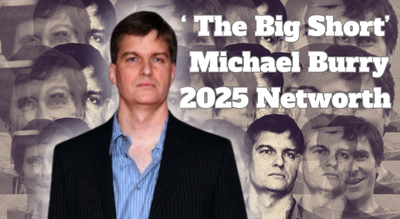ARTICLE AD BOX

Michael Burry’s Scion Asset Management recently placed $1.1 billion in bets against Nvidia and Palantir, managing roughly $1.38 billion total
Michael Burry, the real-life investor immortalised by Christian Bale in The Big Short (2015), built his reputation on one of the most daring financial calls in modern history. Long before the 2008 financial crisis hit, Burry identified the fragility of the US mortgage-backed securities market and positioned his hedge fund, Scion Capital, to profit from its collapse.
When the crash came, he and his investors made hundreds of millions of dollars. Originally trained as a medical doctor, Burry’s passion for markets began while studying at Vanderbilt University School of Medicine. His transition from medicine to money management was grounded in deep, data-driven value investing and rigorous fundamental analysis. By the time he launched Scion Capital in 2000, his contrarian instincts had already set him apart.
Even during the dot-com crash, his fund posted strong returns by identifying undervalued stocks and shorting overhyped ones. Today, Burry runs Scion Asset Management, a private investment firm that continues his trademark contrarian strategy, betting against what he sees as overvalued assets and taking long positions on those the market underappreciates. His reputation for spotting bubbles before they burst has made his every move a matter of public fascination.
Burry’s unpredictable presence on social media, where he often posts ominous one-liners before deleting them, only fuels this fascination. An X (formerly Twitter) account called Michael Burry Archive exists solely to preserve his deleted posts. Yet since spring 2023, the legendary investor has gone completely silent online, until a week ago.
Why Burry is back in the spotlight
After two quiet years, Michael Burry has re-emerged with another high-conviction bet — this time targeting the booming AI sector.
Through Scion Asset Management, he has placed put options worth a combined $1.1 billion against two of the industry’s most celebrated companies: Nvidia and Palantir Technologies. The latest regulatory filings show Scion purchased:
- 5 million put options on Palantir Technologies Inc., carrying a notional value of $912.1 million, and
- 1 million put options on Nvidia Corporation, worth $186.58 million.
These positions together dominate Scion’s portfolio, accounting for nearly 80 percent of its total US holdings. The portfolio itself has shrunk from 15 positions in June 2025 to just eight by the end of Septembe, a clear sign of Burry’s conviction. Through this move, Burry is effectively wagering that the current AI boom, driven by soaring valuations and investor euphoria, is unsustainable. In his view, the growth of cloud computing is slowing, capital expenditures are ballooning, and the market’s expectations have run far ahead of economic reality. He has even compared the AI rally to the dot-com bubble of the early 2000s and the housing bubble he famously shorted in 2008. Whether this new “Big Short 2.0” proves prophetic or premature remains to be seen, but the audacity of the move has reignited debate across Wall Street about whether artificial intelligence is becoming the next great bubble.
Scion asset management’s portfolio and positions
Burry’s Q3 2025 portfolio reflects extreme concentration and conviction, a hallmark of his investing style.
| Palantir Technologies Inc. | PUT options | 66.08 % | 5,000,000 | $912,100,000 |
| Nvidia Corporation | PUT options | 13.52 % | 1,000,000 | $186,580,000 |
| Pfizer Inc. | CALL options | 11.08 % | 6,000,000 | $152,880,000 |
| Halliburton Company | CALL options | 4.46 % | 2,500,000 | $61,500,000 |
| Molina Healthcare Inc. | Common stock | 1.73 % | 125,000 | $23,920,000 |
| Lululemon Athletica Inc. | Common stock | 1.29 % | 100,000 | $17,793,000 |
| SLM Corp (Sallie Mae) | Common stock | 0.96 % | 480,054 | $13,287,895 |
| Bruker Corp 6.375 % Preferred Series A | Preferred stock | 0.95 % | 48,334 | $13,137,181 |
Two-thirds of Scion Asset Management’s entire portfolio rests on the Palantir short alone, an extraordinary level of concentration that rivals Burry’s famous 2008 mortgage trade.
With nearly $1 billion tied up in AI-related shorts, this position dominates the firm’s holdings and highlights Burry’s conviction that AI valuations are dangerously inflated.To put this in context, Scion Asset Management now manages a total U.S. stock portfolio of around $1.38 billion, meaning that the Palantir and Nvidia bets alone account for the bulk of the firm’s exposure. The move is either a masterstroke of foresight, if the AI market corrects sharply, or a high-stakes overreach, should valuations continue to rise.
How much is Michael Burry worth today?
As of early 2025, Michael Burry’s personal net worth is estimated at around $300 million. This figure reflects his cumulative earnings from past trades, fund management fees, and personal investments, including the extraordinary profits he made during the 2008 housing market collapse.However, this valuation tells only part of the story. Burry’s wealth could have been considerably higher were it not for the timing of one pivotal trade made through his investment firm, Scion Asset Management, in 2020.At the time, Scion had quietly built a stake of about 1.7 million shares, representing roughly 5.3 percent of GameStop Corp, a struggling video game retailer that Burry believed was both undervalued and heavily shorted. His thesis was simple yet prescient: the company’s balance sheet was cleaner than the market assumed, and its aggressive share buybacks and renewed focus on e-commerce could deliver a turnaround.Yet just as the now-infamous GameStop short squeeze was about to unfold, Burry exited his position. Scion sold its entire holding in the fourth quarter of 2020, when GameStop’s share price hovered between $10 and $20. The sale likely netted the fund around $100 million, a solid return, but modest compared with what was to follow.Only weeks later, retail traders, galvanised by online forums and zero-commission trading — sent GameStop’s shares soaring to nearly $480 per share in January 2021.
Had Burry held Scion’s full position through that peak, the fund could have realised gains exceeding $1 billion.While hindsight makes the missed windfall stark, the decision was consistent with Burry’s disciplined, fundamentals-driven approach: he had invested in GameStop for its intrinsic value, not to chase a speculative frenzy. Still, the timing underscores how even the market’s most contrarian minds cannot always predict the unpredictable.
A contrarian once more
Michael Burry’s decision to short Nvidia and Palantir is a defining moment of his post-crisis career. It brings him full circle, once again challenging market consensus when enthusiasm is at its peak. His record suggests that when he sees irrational exuberance, he acts decisively and often alone. Whether his latest wager against the AI boom becomes another legendary call or a rare misstep, Burry’s conviction remains unmistakable. In a market captivated by artificial intelligence and growth narratives, he stands as a reminder that even in 2025, one of finance’s most famous sceptics still sees reason to bet against the crowd.

 1 hour ago
4
1 hour ago
4








 English (US) ·
English (US) ·